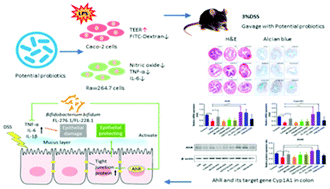Bifidobacterium bifidum relieved DSS-induced colitis in mice potentially by activating the aryl hydrocarbon receptor
Abstract
Inflammatory bowel disease (IBD) characterized by relapsed intestinal inflammation and barrier function disruption is still a great therapeutic challenge. This study aimed to screen probiotics that have the potential to help alleviate IBD and further elucidate their mechanism of action. Caco-2 cell differentiated monolayers and RAW264.7 cells stimulated by lipopolysaccharide (LPS) were used for probiotic screening in vitro, and then the efficacies of the obtained six bacterial strains were evaluated in mice with dextran sulfate sodium (DSS)-induced colitis. The results showed that all of the strains at varying degrees could increase the transepithelial electrical resistance (TEER) value, decrease the influx of FITC-dextran in Caco-2 cell monolayers and attenuate the production of nitric oxide (NO), tumor necrosis factor-α (TNF-α) and interleukin-6 (IL-6) in LPS-stimulated RAW264.7 cells. In vivo experiments indicated that Bifidobacterium bifidum FL-276.1 (FL-276.1) and Bifidobacterium bifidum FL-228.1 (FL-228.1) showed the best efficacies to ameliorate body weight loss, colon shortening, and intestinal barrier disruption. Accordingly, in FL-276.1 and FL-228.1 groups, the genes of zonula occludens-1 (ZO-1), claudin-4, occludin and mucin 2 (Muc2) in mouse colonic tissues were significantly upregulated, while TNF-α, IL-1β and IL-6 were downregulated. Further results showed that strains FL-276.1 and FL-228.1 could activate the aryl hydrocarbon receptor (AhR) in the intestine. Our study showed that the two Bifidobacterium bifidum strains, FL-276.1 and FL-228.1, ameliorated DSS-induced colitis by enhancing the intestinal barrier and anti-inflammation potentially via the AhR pathway.



 Please wait while we load your content...
Please wait while we load your content...